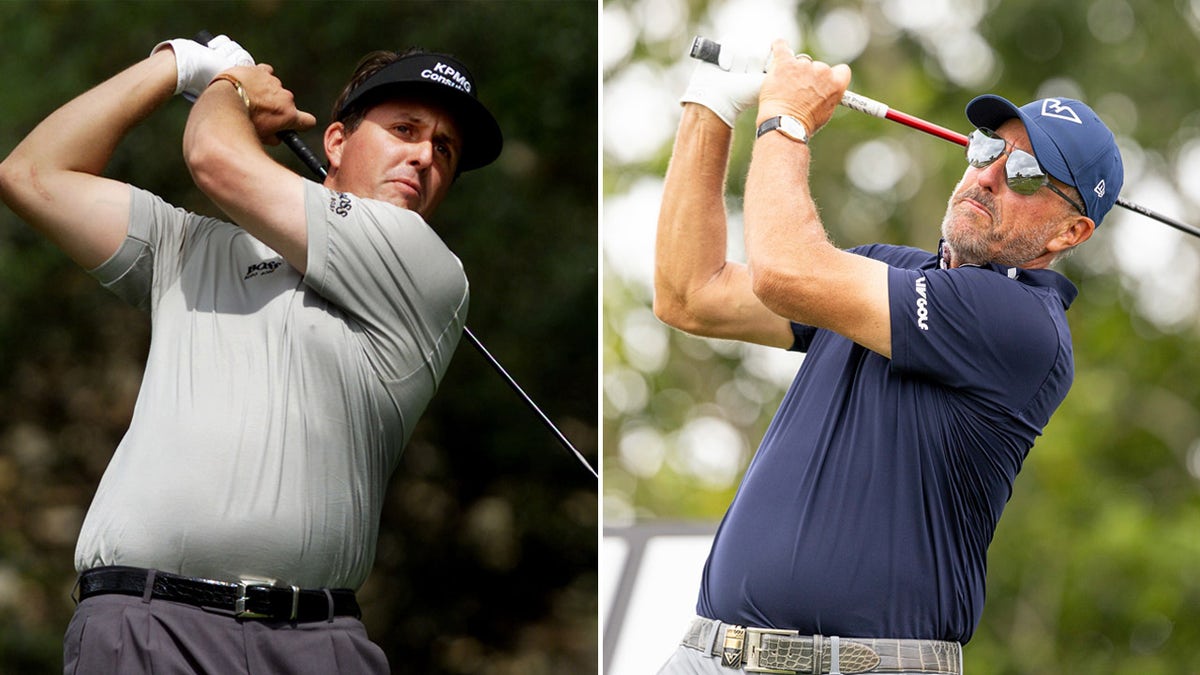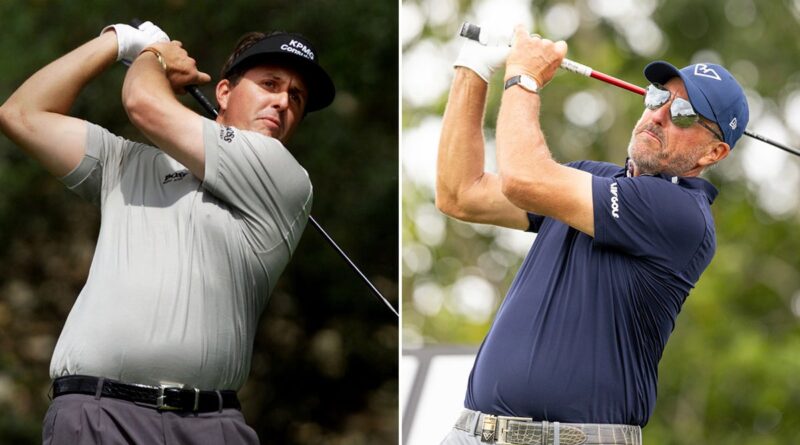Strict fasting diet helped golfer Phil Mickelson lose 25 pounds
Professional golfer Phil Mickelson, who made his 32nd start in The Masters this week, has been open about his commitment to health and wellness.
The six-time major champion and three-time Masters winner has said he follows a five-day prolonged fast, which led to him dropping 25 pounds in 2023.
Intermittent fasting (IF) has become a popular weight-loss strategy in recent years.
THIS WEIGHT LOSS PLAN PERFORMS BETTER THAN TRADITIONAL DIETING, STUDY FINDS
There are several types of intermittent fasting — but they all follow the same concept of alternating between fasting and eating.

Phil Mickelson is pictured competing in golf tournaments 24 years apart, in 2001 (left) and 2025 (right). The six-time major champion and three-time Masters winner has said he follows a five-day prolonged fast, which led to him dropping 25 pounds in 2023. (Reuters / AP )
With a time-restricted approach, the dieter only eats during a certain window. For example, with the 16/8 method, the person fasts for 16 hours and then can eat within an eight-hour span, between 10 a.m. and 6 p.m.
Other versions involve fasting for a full 24 hours once or twice per week — or only consuming limited calories on fasting days.
FASTING-LIKE DIET COULD SLOW THE AGING PROCESS, STUDY SUGGESTS: ‘LIVING LONGER AND HEALTHIER’
Dr. Christopher Rhodes — a longevity, fasting and biomimetics researcher in California, shared his thoughts on Mickelson’s radical fasting program, which also includes drinking coffee with supplements.
“A five-day prolonged fast like the one Phil Mickelson follows will have profound effects on metabolism and weight loss,” he told Fox News Digital.

Phil Mickelson watches on the sixth hole during the first round at the Masters golf tournament on April 10, 2025, in Augusta, Georgia. The athlete has been open about his commitment to health and wellness. (AP Photos)
“It fundamentally shifts the energy state and fuel sources in the body and forces stored fat to be burned as energy, but certainly at the expense of elite athletic performance, especially in the later stages of a fast.”
Potential risks
Fasting for longer than 24 hours will deplete the body’s glycogen stores and cause it to enter ketosis, a state where it primarily burns fat and ketones for energy, according to Rhodes, who is also the founder of nutrition company Mimio Health.
“While this will accelerate fat loss and provide benefits to overall metabolic health, the body will still need to produce some of its own glucose in order to support brain function and will start to break down protein sources, like muscle, to maintain proper glucose levels.”
“A five-day prolonged fast like the one Phil Mickelson follows will have profound effects on metabolism and weight loss.”
Over time, this will result in muscle breakdown, strength loss, fatigue and lower overall energy levels, which could hinder athletic performance, according to the expert.
Mickelson has spoken about his own muscle loss as a result of his fasting.
“I also lost muscle, so I had to start lifting, and I’ve been lifting and slowly have been getting my speed and strength back to where I need it to be,” he said during the 2023 Masters.

There are several types of intermittent fasting — but they all follow the same concept of alternating between fasting and eating. (iStock)
For elite athletes, maintaining muscle mass and metabolic flexibility is critical, Rhodes said.
“Extended fasts may slow down recovery, impair high-intensity exercise performance and even reduce power output if not properly managed.”
The doctor cautioned that a prolonged five-day fast should not be performed more than a few times per year, with plenty of recovery time in between.
FASTING COULD REDUCE SIGNS OF ALZHEIMER’S DISEASE, STUDIES SUGGEST: ‘PROFOUND EFFECTS’
Certain groups — such as those at risk of muscle loss, like the elderly — should avoid five-day fasts, he said.
“While fasting can improve insulin sensitivity, cognition, cellular function and metabolic efficiency, shorter intermittent fasting windows or fasting-mimicking strategies may offer similar metabolic benefits without the drawbacks of extreme caloric restriction,” Rhodes added.
Smart supplements
Mickelson reportedly drinks coffee with supplements during his fasts, something Rhodes recommends as a means of preserving energy and muscle mass during weight loss.
“During prolonged fasting, the body begins to break down both protein and fat for energy, which can lead to muscle loss,” he said.

Mickelson reportedly drinks coffee with supplements during his fasts, something Rhodes recommends as a means of preserving energy and muscle mass during weight loss. (iStock)
“Supplements such as amino acids, fatty acids, electrolytes and certain metabolic bioactives can help mitigate this.”
The doctor noted that supplementing with branched-chain amino acids (BCAAs), creatine or HMB (hydroxymethylbutyrate) can help to preserve muscle tissue, performance and strength while staying in a fasted state.
INTERMITTENT FASTING COULD REDUCE HAIR GROWTH, STUDY REVEALS
“Likewise, supplementing with essential vitamins, minerals, amino acids and omega 3s like EPA and DHA, which the body cannot produce on its own, would be crucial for maintaining high-level functionality during prolonged multi-day fasting,” he added.

Phil Mickelson hits from the fairway on the first hole during the first round at the Masters golf tournament on April 10, 2025, in Augusta, Georgia. For elite athletes, maintaining muscle mass and metabolic flexibility is critical, Rhodes said. (AP Photos)
Caffeine from coffee can also serve to provide calorie-free energy, Rhodes noted, while also suppressing appetite and providing a cognitive boost to combat potential fasting-induced brain fog.
“Prolonged fasting can deplete electrolytes like sodium, potassium and magnesium, which are essential for muscle function, hydration and energy production,” he said. “If his supplements include these electrolytes, they may help prevent cramping and fatigue.”
Importance of strength training
Regarding Mickelson’s comments about lifting weights during his fasting stints, Rhodes agreed that weightlifting is essential for preserving and building muscle during weight loss.
CLICK HERE TO GET THE FOX NEWS APP
“The body operates on a ‘use it or lose it’ principle, especially during periods of caloric restriction or fasting, where it’s actively needing to mobilize energy sources from the body to sustain itself,” the doctor said.
“Muscle is one of the most energetically costly tissues to sustain, so if we’re not using it on a daily basis, the body will preferentially start breaking down muscle to conserve energy.”

Weightlifting is essential for preserving and building muscle during weight loss, experts agree. (iStock)
Resistance training sends a signal to the body that lean mass is essential for survival and tells it to prevent excessive muscle breakdown, prioritizing fat for fuel.
“For athletes like Mickelson, weightlifting also helps maintain neuromuscular coordination, joint integrity and power output,” Rhodes said.
CLICK HERE TO SIGN UP FOR OUR HEALTH NEWSLETTER
“Strength training improves insulin sensitivity, enhances metabolic rate and ensures that weight loss comes primarily from fat rather than muscle.”
It’s also important to refuel after a fast with adequate protein intake, the expert added.
Finding healthy patterns
Ultimately, according to Rhodes, the best way to support long-term weight loss and metabolic health is to find a pattern of eating that works for the individual and can be sustained for the long haul.
“During prolonged fasting, the body begins to break down both protein and fat for energy, which can lead to muscle loss.”
“While some find that periods of fasting are helpful in resetting their hunger and satiety cues and developing a better relationship with food, others may find it too restrictive and overwhelming, setting themselves up for failure and rebound binging down the road,” he said.
For more Health articles, visit www.foxnews.com/health
“Every person is different, but prioritizing nutrient-dense, minimally processed foods that are rich in fiber, protein and healthy fats can aid significantly in reducing cravings and improving quality of life and meal satisfaction.”





